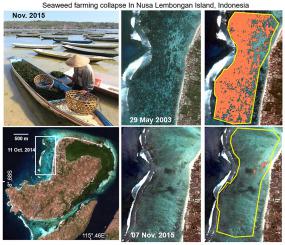Ocean & Coastal Management ( IF 4.6 ) Pub Date : 2021-03-08 , DOI: 10.1016/j.ocecoaman.2021.105586 Serge Andréfouët , I.Made Iwan Dewantama , Eghbert Elvan Ampou

|
The culture of seaweed for the food and cosmetics industry is central to many rural households in Indonesia. The activity has vastly expanded in the past three decades, but in some cases, an opposite trend is now emerging. Spaceborne images were used to monitor the recent collapse of seaweed farming around the small island of Nusa Lembongan, Bali, Indonesia. A simple semi-quantitative Seaweed Farming Index highlighted the different dynamics for four different sectors around the island, with abrupt or gradual changes starting in 2012. By 2017, seaweed farming had eventually vanished from the island, after sustaining local livelihoods for more than 30 years and influencing the zoning plan of the local Marine Conservation Area since 2010. Interviews of 50 ex-farmers in 2018 identified the reasons of the changes: failed crop, low selling prices, shrinking space to dry algae against coastal development, and easy alternative jobs in tourism, although not necessarily providing better salary incomes. Tourism attracted half of these farmers, while another 25% went into building construction, itself largely driven by tourism development. The vulnerability of a complete shift to tourism was highlighted when tourism temporarily collapsed for several months due to threat of a Bali volcano eruption in late 2017. This prompted ex-farmers to consider returning to farming. This integrated case study based on remote sensing and household surveys highlights the fast-changing dynamics of Indonesia coastal socio-ecosystem due to largely to tourism development and natural hazards. The consequences for local management are discussed.
中文翻译:

印度尼西亚的旅游业和自然灾害加剧了海藻的种植业崩溃和快速变化的社会生态系统:从太空和努沙蓝梦岛家庭的角度看。
对于食品和化妆品行业来说,海藻养殖对于印度尼西亚的许多农村家庭来说都是至关重要的。在过去的三十年中,该活动已大大扩展,但在某些情况下,现在正出现相反的趋势。航天图像被用来监测印度尼西亚巴厘岛努沙蓝梦岛(Nusa Lembongan)小岛附近海藻养殖的近期崩溃。一个简单的半定量海藻养殖指数突显了岛上四个不同部门的动态,从2012年开始突然或逐渐变化。到2017年,在维持当地生计30多年后,海藻养殖最终从该岛上消失了。自2010年以来影响了当地海洋保护区的分区计划。2018年对50位前农民的采访确定了变化的原因:作物歉收,售价低,干燥藻类的空间不断缩小,不利于沿海地区的发展,在旅游业中也容易找到替代工作,尽管不一定能提供更好的薪水收入。旅游业吸引了这些农民中的一半,而另外25%的人从事建筑建设,这主要是由旅游业发展驱动的。由于巴厘岛火山在2017年底爆发的威胁,旅游业暂时崩溃了几个月,这突显了完全转向旅游业的脆弱性。这促使前农民考虑重返农业。这项基于遥感和家庭调查的综合案例研究强调了印度尼西亚沿海社会生态系统的快速变化动态,这在很大程度上归因于旅游业的发展和自然灾害。讨论了对本地管理的后果。和旅游业中容易找到的替代工作,尽管不一定能提供更好的薪水收入。旅游业吸引了这些农民中的一半,而另外25%的人从事建筑建设,这主要是由旅游业发展驱动的。由于巴厘岛火山在2017年底爆发的威胁,旅游业暂时崩溃了几个月,这突显了完全转向旅游业的脆弱性。这促使前农民考虑重返农业。这项基于遥感和家庭调查的综合案例研究强调了印度尼西亚沿海社会生态系统的快速变化动态,这在很大程度上归因于旅游业的发展和自然灾害。讨论了对本地管理的后果。和旅游业中容易找到的替代工作,尽管不一定能提供更好的薪水收入。旅游业吸引了这些农民中的一半,而另外25%的人从事建筑建设,这主要是由旅游业发展驱动的。由于巴厘岛火山在2017年底爆发的威胁,旅游业暂时崩溃了几个月,这突显了完全转向旅游业的脆弱性。这促使前农民考虑重返农业。这项基于遥感和家庭调查的综合案例研究强调了印度尼西亚沿海社会生态系统的快速变化动态,这在很大程度上归因于旅游业的发展和自然灾害。讨论了对本地管理的后果。而另外25%的建筑则主要由旅游业发展推动。由于巴厘岛火山在2017年底爆发的威胁,旅游业暂时崩溃了几个月,这突显了完全转向旅游业的脆弱性。这促使前农民考虑重返农业。这项基于遥感和家庭调查的综合案例研究强调了印度尼西亚沿海社会生态系统的快速变化动态,这在很大程度上归因于旅游业的发展和自然灾害。讨论了对本地管理的后果。而另外25%的建筑则主要由旅游业发展推动。由于巴厘岛火山在2017年底爆发的威胁,旅游业暂时崩溃了几个月,这突显了完全转向旅游业的脆弱性。这促使前农民考虑重返农业。这项基于遥感和家庭调查的综合案例研究强调了印度尼西亚沿海社会生态系统的快速变化动态,这在很大程度上归因于旅游业的发展和自然灾害。讨论了对本地管理的后果。这促使前农民考虑返回农业。这项基于遥感和家庭调查的综合案例研究强调了印度尼西亚沿海社会生态系统的快速变化动态,这在很大程度上归因于旅游业的发展和自然灾害。讨论了对本地管理的后果。这促使前农民考虑返回农业。这项基于遥感和家庭调查的综合案例研究强调了印度尼西亚沿海社会生态系统的快速变化动态,这在很大程度上归因于旅游业的发展和自然灾害。讨论了对本地管理的后果。



























 京公网安备 11010802027423号
京公网安备 11010802027423号